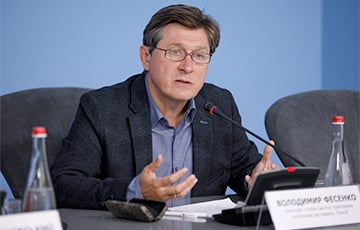Volodymyr Fesenko: We’ll Get The Answer To The Main Question About Trump Soon
13- 31.03.2025, 20:14
- 19,380

Oil tariffs are a serious tool for exerting pressure on Putin.
U.S. President Donald Trump has stated that he will impose secondary tariffs ranging from 25% to 50% on all Russian oil if he believes that Moscow is obstructing his efforts to end the war in Ukraine.
Trump also mentioned that he had "set a psychological deadline" for Putin. Should we expect serious consequences for Russia following these statements?
Charter97.org spoke about this with the well-known Ukrainian political scientist and head of the Center for Applied Political Studies Penta, Volodymyr Fesenko:
— I think we’ll get the answer to this question in the next few weeks. If Trump genuinely wants a partial ceasefire agreement (even just in the air) to be signed in the coming weeks, he should get a positive response from Putin.
Accordingly, there should be information about a new round of negotiations where delegations from three countries should meet. It’s preferable to sign some kind of agreement rather than just an oral commitment.
By the end of the week, we may get information about a new conversation between Trump and Putin. And Putin will either agree or disagree with Trump’s proposal to continue negotiations on the ceasefire. If he disagrees, Trump will need to back up his statements with real actions — imposing sanctions.
If negotiations don't take place in the next week or two, during which at least a partial ceasefire agreement could be signed, Trump will need to back up his words with actions.
So, the next week (at most two) should give us an answer to this question: Is Trump seriously planning to impose these sanctions, or is it just an attempt to pressure Putin?
— Are oil tariffs a serious tool of pressure?
— Yes, they are serious. But we're talking about secondary sanctions. What this means is sanctions that are imposed on companies that violate the sanctions regime. For example, if a bank is servicing transactions with Russia, the U.S. could impose sanctions on it. Specifically, it could prohibit the bank from conducting operations with the U.S.
This, by the way, has had a significant impact on leading banks in Turkey and China. Secondary financial institutions are still involved in servicing transactions with Russia, but the leading banks avoid conflict with the U.S.
I’ve heard opinions from economists that this could be quite serious. But the mechanism is important. We need to understand how this will work. For now, it seems like a very serious threat that could possibly affect Putin. Again, we should get an answer in the near future. Otherwise, by April 20, as Trump wants, it will be physically impossible to get an agreement on a ceasefire.
— There have also been statements regarding Zelensky and the deal on minerals. Trump is threatening serious consequences for Ukraine. How will events unfold?
— Here, we can say that the Ukrainian side will act flexibly. I metaphorically say that we need to navigate between Trump and Putin.
With Putin, it’s easier, we need to stop him, we’re at war with him, and that will continue. But with Trump, we’ll need to navigate carefully. We can’t say "no" to Trump, because it comes with risks.
It could lead to a suspension of the supply of weapons, which, though in smaller quantities, are still going to Ukraine under decisions made by former U.S. President Joe Biden.
The biggest problem would be the suspension of the provision of satellite intelligence information to Ukraine, as well as data that allows for the use of American weapons in Ukraine. This is risky for us. Yes, it's not catastrophic, but it would weaken our position. Therefore, it’s better not to conflict with Trump.
We won’t say "no," but we also can’t say "yes." The way the agreement is currently presented it’s unacceptable to us. Specifically, as Zelensky said, we can’t consider the help provided to Ukraine for free and irrevocably as a debt.
We will act just as we did in February. At that time, the first five proposals for an agreement presented to Ukraine were also unacceptable to us, and there were two weeks of intense negotiations.
Now, the agreement is large, with many details. It’s already known that the format of the minerals agreement is not quite correct. It’s a commercial agreement, not an intergovernmental one.
This is already a reason to start working on modifying it. The Ukrainian side can say that we are ready to sign the agreement, but it needs to be brought to a proper form, made legally acceptable, otherwise, anyone could challenge it in court.
I think that negotiations on this agreement have already begun. There will be an exchange of options, and it will take more time than last time. Then, it was a framework agreement of 12-15 pages, and now it’s 58 pages. It will take more time.
I think this will take at least several months. By the way, I think the military situation and the course of negotiations will affect the work on this agreement, as well as how relations between Ukraine and the U.S. develop, which will also influence the resource agreement.
At this point, it’s clear that the Trump administration is more interested in this agreement than Ukraine.










